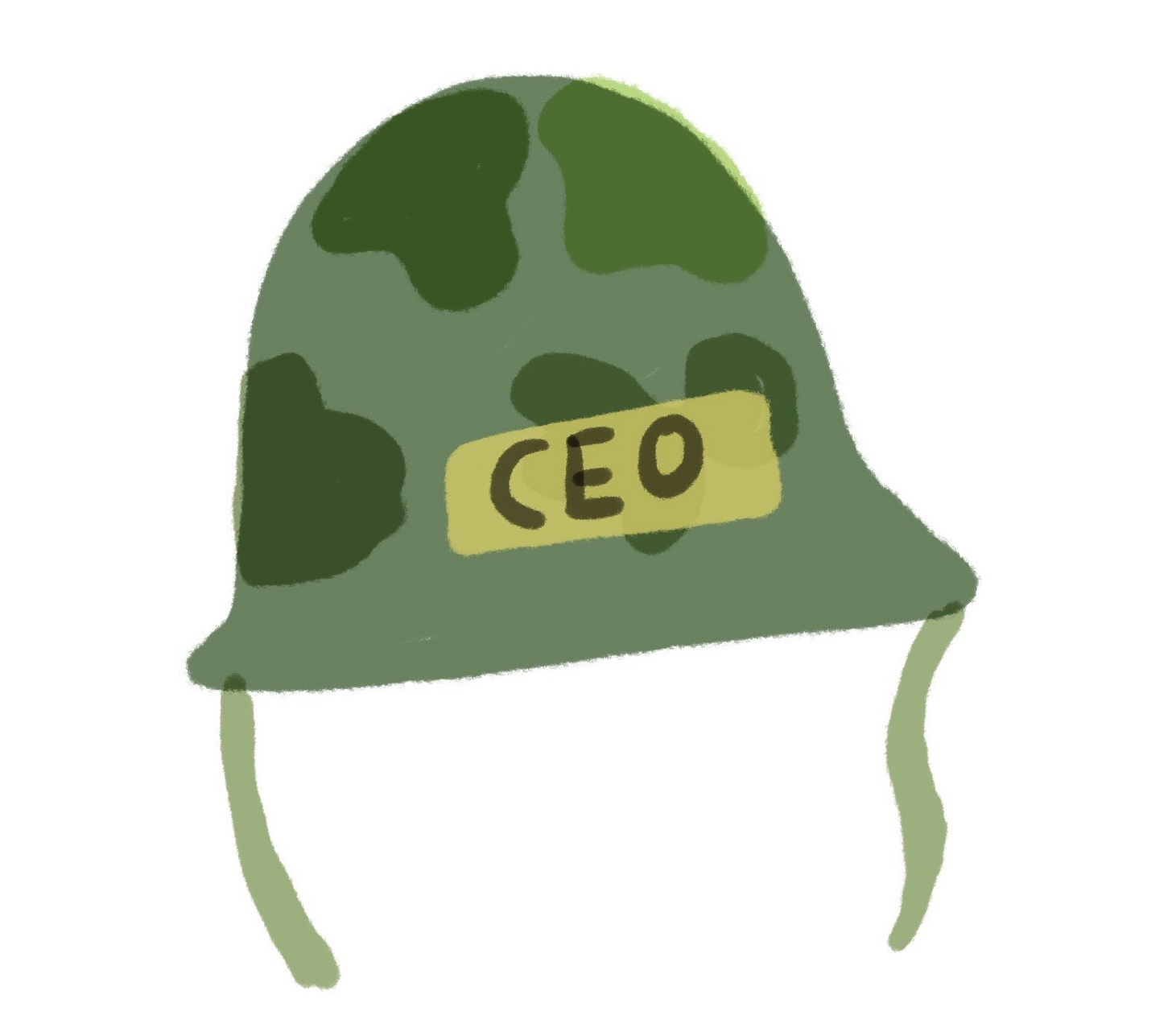
Subscribe: — iTunes. — Stitcher. — Spotify. — Overcast. — Download.
As the COVID-19 crisis unfolds, a lot of businesses find themselves in a tough spot. Studies and surveys tell us that a significant number of small businesses—as many as half—have less than a month of cash on hand. It’s frightening to think that if things don’t go right for 30 days, most businesses are in serious trouble.
People’s instinct is to think: “It’s too late now. There’s nothing I can do.” But there are things you can do now to protect your business and employees (and their families) while supporting your customers. If you’re in a business—especially one in which a lot of people depend on you—recognize your responsibility and act.
Don’t assume this is the bottom
First, understand that you don’t really know how bad it could get—because it could get much worse. If you haven’t yet built a cash buffer, it’s not too late to start. It may be time to cut costs and preserve cash.
Your obligation as a leader is to imagine what the future might look like and to put yourself in a position to act. Look toward the horizon and try to get ahead of it.
Adopt a ‘wartime CEO’ mindset
A crisis like this requires you to adopt a wartime CEO mindset, as Ben Horowitz writes in “The Hard Thing About Hard Things.” You might have been doing a great job running your business for the past decade during peacetime. But now it’s wartime, and something different is required of you. Different rules apply.
“Peacetime” in business means the company has an advantage over the competition, the market is growing, and the company can focus on expanding the market and reinforcing its strengths.
“Wartime” means a company is fending off an imminent, existential threat—a competitor, a change in technology, a macro-economic change, or a pandemic that demands something different from you.
Scenario planning
Ask yourself, “What if things get worse?” If you have 30 days of cash left and revenue is cut in half, then you have 60 days left. What can you do now to make it more likely that revenue will return? Alternatively, if revenue isn’t likely to return, what can you do now to put yourself in a better position to survive?
You might have to pivot
Restaurants were forced to close and dealt with it by pivoting to take-out. Owners of distilleries that converted to producing hand sanitizer look like heroes. When you get in a crisis situation, you’re always better off if you’re nimble enough to do things that support your customers.
This is an opportunity to distinguish your company
People will remember how you behaved when things got tough. It can have great long-term implications for your business. Bad behavior is always remembered, so be sensitive to your customers. You could get focused on an acute problem your customers are facing.
Talk to your employees like adults
A wartime CEO has to be very effective at communicating. When there is an existential threat to the business, your employees will naturally worry. Tell them what’s happening and what it means based on what you know—and be open about the things you don’t know. Let people know you have a plan for how you’re going to handle it.
If people believe in you, they will accept hard choices
The faith employees have in the organization and you in your leadership role are critical to pulling an organization through a difficult time. If people believe in you, they’ll accept a disruption of their normal work; they’ll volunteer to make sacrifices.
Internal challenges are not your customer’s problem
For the most part, internal challenges of an organization are not your customers’ problem. Your customers care about their own problems. So limit what you make public.
If you tell your customers and suppliers that you’re facing a cash-flow problem, they don’t know if you’re being totally transparent. If it ends up being a one-off thing, that could forever change their impression of you.
Entrepreneurs step up in hard times
A crisis like this helps to highlight one of the reasons I love entrepreneurs. They all choose to take responsibility for somebody else’s family. People talk about becoming a founder like it’s this big aspirational thing, but the reality is you’re picking up a really heavy rock and carrying it on your shoulders. You’re either cut out for that or you’re not.
Links:
“The Hard Thing About Hard Things,” by Ben Horowitz
Transcript
Matt: As the COVID-19 crisis continues to unfold, a lot of businesses are in a really tough spot. I saw a chart showing that most small businesses have less than 30 days of cash on hand as a buffer. It’s frightening to think that if things don’t go right for 30 days, most businesses are in serious trouble. People’s instinct is to think, “It’s too late now. There’s nothing I can do” It’s true that some of the things you could have done to put yourself in a better position are now gone. However, the longer you wait to do something, the worst position you’re going to find yourself in.
Antony: What should businesses be doing?
Matt: First, understand that you don’t really know how bad it could get—because it could get much worse. It’s important to come to terms with the fact this is the new reality. If you’re in a business—especially one in which a lot of people depend on you—recognize your responsibility and act.
In “The Hard Thing About Hard Things,” Ben Horowitz writes about the difference between a peacetime CEO and a wartime CEO. Some people are extremely good in a wartime scenario, and some people are extremely good in a peacetime scenario. Great leaders strive to do well in both.
You might have been doing a great job running your business for the past decade during peacetime. But now it’s wartime, and something different is required of you. Different rules apply.
Knowing the distinction between wartime and peacetime is key. In business, “peacetime” means the company has an advantage over the competition, the market is growing, and the company can focus on expanding the market and reinforcing its strengths. “Wartime” means a company is fending off an imminent, existential threat—a competitor, a change in technology, a macro-economic change, or a pandemic that demands something different from you.
Antony: How do you shift your thinking? Is it a matter of short-term thinking versus long-term thinking?
Matt: It’s short-term thinking with an eye for the long term. During peacetime, you can be generous and thoughtful and try new things. You can experiment and stick with decisions to avoid ruffling feathers. As a peacetime CEO, you might say, “We always act in good faith” and invest in long-term culture building. As a wartime CEO, you can’t afford to lose. You have no tolerance for distractions or deviations from the “prime directive,” as Horowitz writes. A peacetime CEO knows that proper protocol leads to winning. A wartime CEO breaks protocols in order to win.
It’s important for a CEO to step into that mindset. As a business owner, you have a responsibility to your employees and their families, and to your customers. To not step in and lead is a huge mistake, especially when there’s a fundamental change taking place.
Antony: If I were to summarize, you want to concentrate on two areas: narrowing the focus of your company and narrowing the risk.
Matt: Yes, exactly.
Antony: We started off talking about preparing for the worst. What if you’re now past the point preparing?
Matt: You’re not. Remember: It could get worse. Don’t assume that this is the bottom. Look toward the horizon and try to get ahead of it. Your obligation as the leader of an organization is to imagine what the future might look like and to put yourself in a position to act.
Antony: What can business leaders do now to strengthen their position?
Matt: The key to all of this is “scenario planning,” a concept developed by the military that then got introduced in business. Think of it like war-gaming: You imagine what comes next. There’s a pandemic and economic slowdown—what would that mean? How will I respond if the people who rent homes for me don’t pay? How will the banks respond if I miss mortgage payments? Can I get ahead of it in some way?From there, given those circumstances at that moment, what’s most likely to happen next?
You need to do that for your business. Ask yourself, “What if things get worse?” If you have 30 days of cash left and revenue gets cut in half, then you have 60 days left. Do you expect revenue to turn in the next 30 days, or do you expect to have to cut more expenses? If you expect revenue to turn, what can you do now to make that more likely to happen? If you don’t, can you cut expenses earlier to put yourself in a better position to survive?
Do scenario planning to come up with a hypothesis given what you know. Then, look hard for evidence to disprove it.
Antony: We’ve been talking about defense. Does there need to be some offense as well?
Matt: In situations like this, it’s particularly difficult to play offense. You can generate near-term revenue with a focused marketing campaign in pretty much any business. But you have to be very careful about the long-term consequences of looking exploitative. A crisis like this is an opportunity to distinguish yourself from your competition. People will remember how you behaved when things got tough. It can have great long-term implications for your business. Bad behavior is always remembered, so be sensitive to your customers. You could get focused on an acute problem your customers are facing.
You also have to be prepared to do things that you or your business don’t normally do. A lot of restaurants have dealt with this by pivoting to take-out. People who had a distillery and converted it to produce hand sanitizer look like heroes. When you get in a crisis situation, you’re always better off if you’re nimble enough to do things that support your customers.
Matt: Another thing about being a wartime CEO is they have to be very effective at communicating. When there is an existential threat to the business, people are naturally going to be concerned. Your employees might worry about losing their job or about their status within the organization. The most important thing is to talk to them like adults. Tell them what’s happening and what it means based on what you know, and be open about the things you don’t know.
Make sure people know what’s happening and that you have a plan for how you’re going to handle it. The faith employees have in the organization and you in your leadership role are critical to pulling an organization through a difficult time.
If they believe in you, people will accept hard choices. They’ll accept a disruption of their normal work and volunteer to make sacrifices.
Antony: At what point do you have to communicate externally what you’re doing?
Matt: For the most part, internal challenges of an organization are not your customers’ problem. Your customer and the general public care about their own problems. It usually doesn’t make much sense to make it public-facing, unless it has a real effect on the customer.
If you tell your customers and suppliers that you’re facing a cash-flow problem because it’s going to affect them in some way, they don’t know what you’re not telling them; they don’t know if you’re being totally transparent. And if that’s all it ends up being, a one-off thing, making it public could forever change their impression of you. It’s not their problem—unless it actually is a problem, in which case, of course, you should tell them.
Antony: As someone who’s taken all these steps, not only for the company that you run but for yourself and your family, talk about that mindset that goes into coping with that level of stress.
Matt: I think this is why I love entrepreneurs and a reason they should get a bit more credit. If they get rich, they’re looked at poorly—but most entrepreneurs don’t get rich. What they all do is choose to take responsibility for somebody else’s family. People talk about becoming a founder like it’s this big aspirational thing—“I can bring big things into reality and maybe get rich along the way”—but the reality is you’re picking up a really, really heavy rock and carrying it on your shoulders. You’re either cut out for that or you’re not.
The inclination of most entrepreneurs is to step into responsibility. The entrepreneurs who survive difficult things are the people who, by default, would end up picking up more responsibility than others if they were put in a room with random people. It’s not a burden to them. It’s a privilege, just like it’s a privilege to be a parent. It’s an obligation and an honor.














Share this post